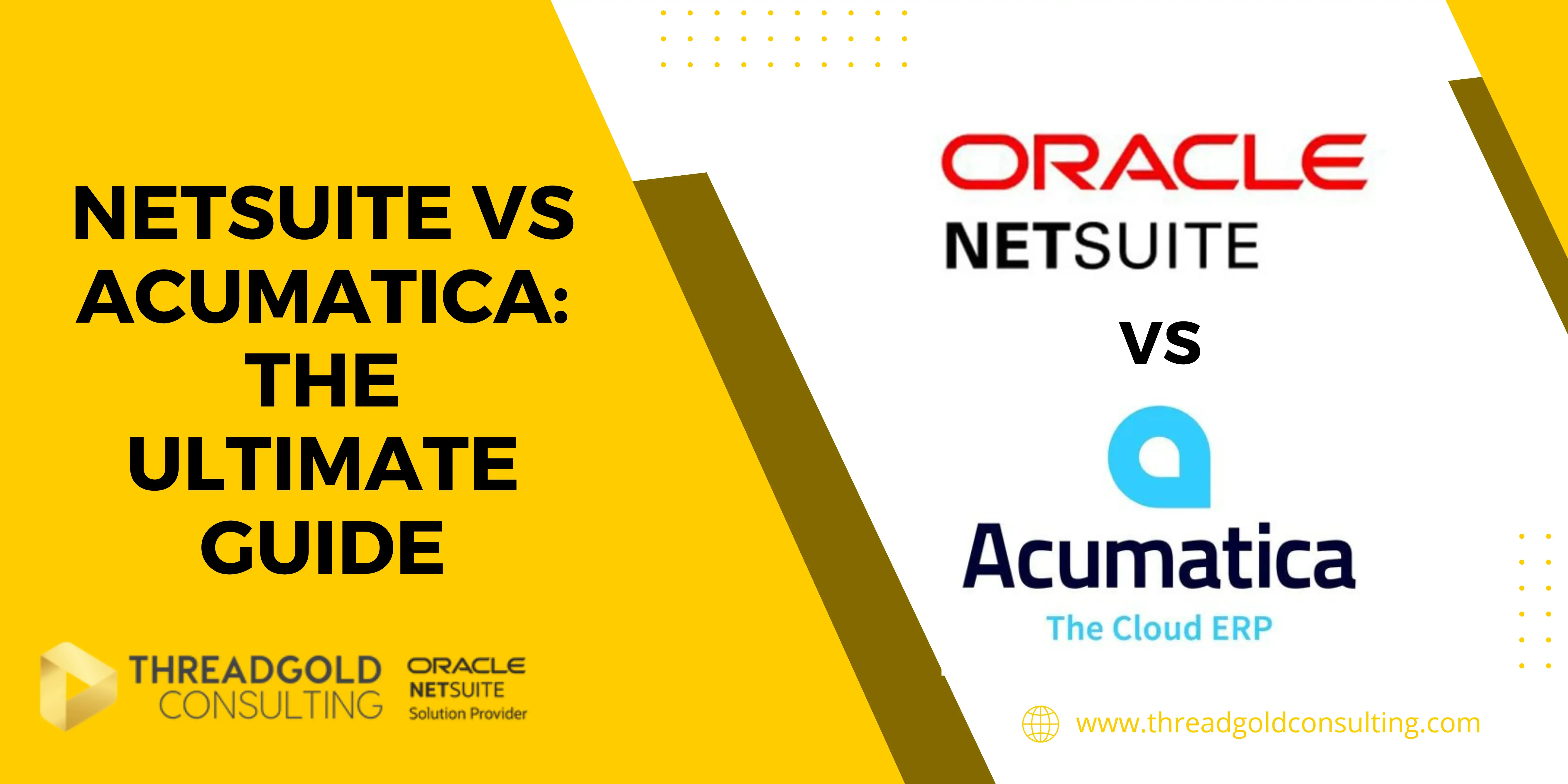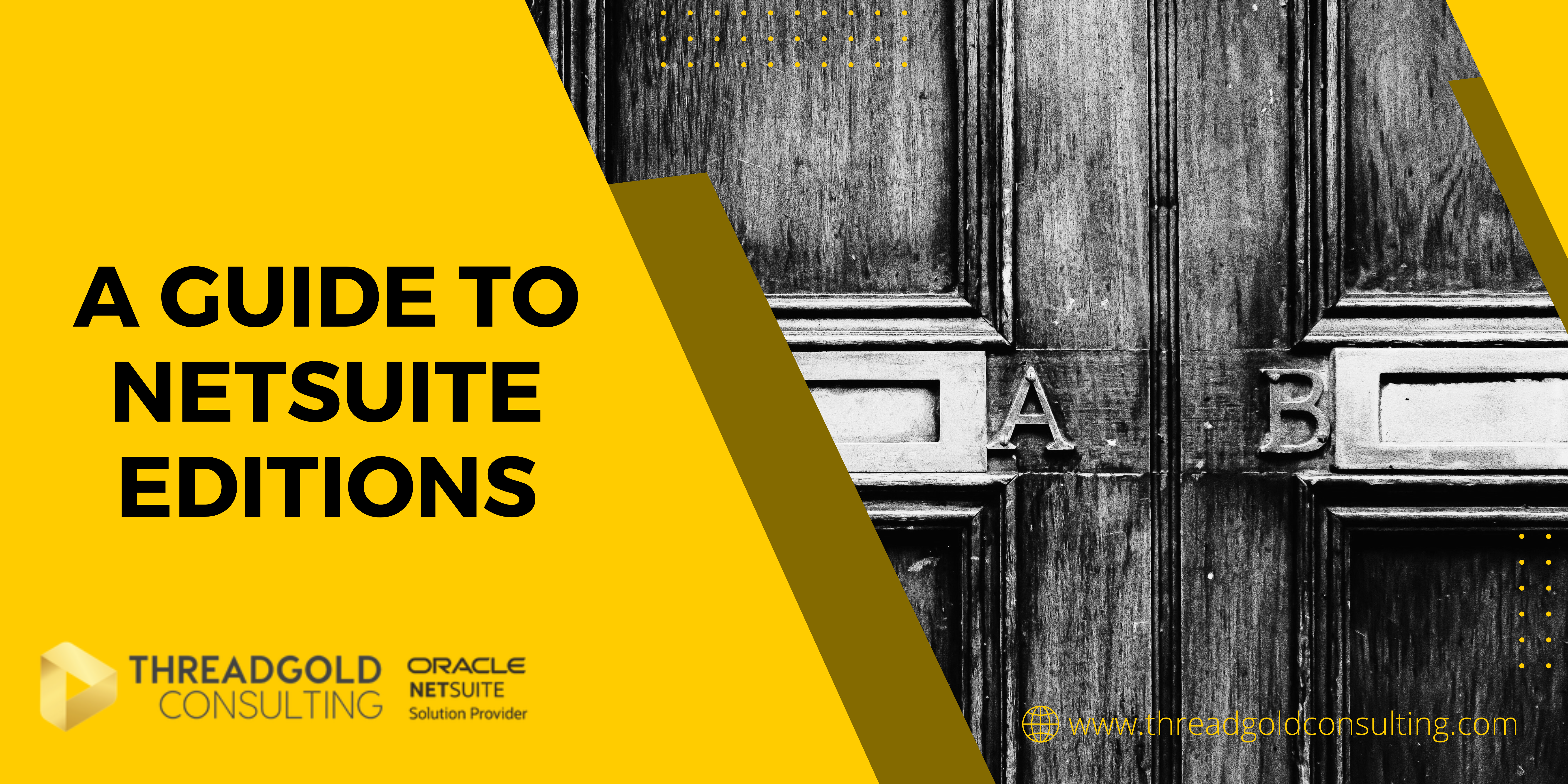Implementing a new ERP solution is a big undertaking that involves considerable investment, time, and planning.
Once you deploy your new ERP, you may have to live with it for a very long time. That is why it is so essential that you choose the right software for your business.
Implementing an ERP system starts with determining where your business is now, where you want to take it, and how you need to get there. It involves a lot of strategic planning, and your workflows and performance will be heavily based on the solution you choose.
To make your choice easier, we have taken the guesswork out of ERP selection by comparing NetSuite with Acumatica in a head-to-head comparison.
What is NetSuite?
Developed by Evan Goldberg in 1998, NetSuite is the world's #1 cloud ERP that combines CRM, marketing, financials, automation, and other business management software functions. It was first used as accounting software but quickly evolved into a fully-fledged ERP solution.
In 2016, Oracle bought NetSuite for $9.3 billion. It is one of the first pioneers to launch a fully cloud-based ERP software solution, and the company serves more than 35,000 customers in 200 countries.
NetSuite is strongest in the following industries:
- Retail & E-commerce
- Advertising, Media & Publishing
- Nonprofits & Social Venture
- Professional Services
- Software and SaaS
- Manufacturing
- Wholesale Distribution
What is Acumatica?
Acumatica is a latecomer to the ERP game, entering the market in 2003. It offers both on-premises and SaaS solutions. Its customer base is relatively small (5,200) but growing. The company caters to small to mid-size companies.
A group of former Microsoft executives runs the company, and its goals are to move into artificial intelligence (AI) and machine learning (ML) to improve the features of its product.
Acumatica is best suited for the following industries:
- Retail & E-commerce
- Manufacturing
- Construction
- Wholesale Distribution
Features and Functionality
Each ERP offers various features and functionality. Your choice will be dependent on what matters most to you and your company. Keep in mind not all components are created equal. Even though both programs offer similar functionality, in some cases, one option may provide deeper insights and handle automation better.
Some of the features compared include:
Financial Management
The lifeblood of any company is its financials. Tight management of money coming in and going out is essential. Both NetSuite and Acumatica offer financial management options. Some of the core functionality includes:
- Accounts Receivable
- Accounts Payable
- General Ledger
- Cash Flow Management
- Tax Management
- Deferred and Recurring Revenue
- Billing
- Fixed Assets
- Payroll
- Bank Reconciliations
When comparing NetSuite with Acumatica, NetSuite has extra financial features that Acumatica does not. Those features include:
- Multi-book Accounting for Compliance
- General Ledger Customization
- Custom Transaction Types
Additionally, Acumatica relies heavily on batch processing, whereas NetSuite does not. This allows NetSuite to deliver real-time analytics and reporting.
Inventory Management
Inventory management is essential for companies in manufacturing and distribution. NetSuite has robust inventory management capabilities, allowing businesses the insights they need to manage fixed assets efficiently. Additionally, NetSuite offers a few different depreciation options, including Last-In-First-Out (LIFO), First-In-First-Out (FIFO), average cost, average group cost, and standard costing methods. The program includes a bill of materials (BOM) module, forecasting, barcoding, and demand planning features.
Acumatica does not offer the LIFO costing model, but both systems support materials resource planning (MRP) upon request.
Supply Chain Management
Both software packages support supply chain management, but NetSuite has additional features that are lacking in Acumatica. Comparing features for supply chain management include:
NetSuite Supply Chain Management Features
- Order Management
- Production Management
- Inventory Management
- Procurement
- Warehouse & Fulfillment
- Demand Planning
- WIP & Routing
- Work Orders & Assemblies
- Shop Floor Control
- BOM Maintenance
Acumatica Supply Chain Management Features
- Order Management
- Inventory Management
- Procurement
- Warehouse & Fulfillment
- Requisition Management
- Human Capital Management
International Operations Features
For global companies, international management features are critical. NetSuite includes those as part of its core functionality, including the ability to work with 190 currencies and 27 different languages.
With Acumatica, you would need to perform currency conversions manually. Their system includes some rudimentary local translation tools, but they are insufficient for most companies.
NetSuite can easily handle multi-locations and legal entities within a single solution, thanks to it's financial consolidation module NetSuite OneWorld. This is crucial for international companies, which must comply with the U.S. generally accepted accounting principles (GAAP) and the international financial reporting standards (IFRS).
Customer Resource Management (CRM) Features
The CRM features of both Acumatica and NetSuite are comparable, including marketing campaign features, sales force automation, prospect tracking, and customer self-service.
Project Management
Both solutions offer project management features, cost tracking, billing, and time and expense management. However, NetSuite also provides a professional services automation (PSA) module for resource management.
Human Capital Management Features
Although Acumatica offers payroll processing as part of its core functionality, all other human resource functions rely on third-party offerings.
NetSuite includes payroll as well as standard human capital management features such as:
- Human Resources Management
- Employee Onboarding
- Vacation Scheduling
- Employee Directories
- Payroll
Analytics and Reporting
Both ERP solutions offer analytics and reporting, but Acumatica is limited in how far you can customize reports. You will need to hire developers to code new features for most customized reports. Additionally, Acumatica's architecture negatively impacts reporting by restricting reports to high-level figures rather than allowing a seamless drill-down. The batch processing also affects the system’s ability to report in real-time.
NetSuite stores all transactions in a single database, making it efficient and easy to pull data in real-time. You can set up "saved searches", which are standard reports that you require each month, saving employees a lot of time and frustration. NetSuite have also recently expanded it's AI capabilities, which mean you can use AI to easily create reports for you. Additionally, you can drill down within a customer account to see all their transactions in a single view, providing a much better user experience.
Retail & E-Commerce Features
Both NetSuite and Acumatica offer support for retail and e-commerce operations, including essentials like Point of Sale, Mobile POS, E-commerce integration, Order Management, and Marketing Automation. However, NetSuite provides deeper functionality and more advanced tools in these areas.
Where NetSuite Stands Out:
- Product Content Management: A native feature in NetSuite that allows for centralized, detailed product data management — something Acumatica lacks out-of-the-box.
- More Mature E-commerce Platform: NetSuite’s SuiteCommerce is more established and customizable than Acumatica’s e-commerce integrations.
- Integrated Omnichannel Experience: NetSuite offers a more seamless connection between physical and online stores.
While Acumatica covers the basics, it tends to rely more heavily on third-party integrations for advanced retail capabilities, making NetSuite the stronger option for businesses seeking a unified, scalable solution.
Partner EcosystemBoth Acumatica and NetSuite have rich partner ecosystems with a diverse selection of resellers you can use to implement and extend your systems. NetSuite offers solution partners, who can sell you the NetSuite license and implement the system, and alliance partners, who aren't authorised to sell you the license but can carry out the implementation.
NetSuite relies on its SuiteApp marketplace, which offers 570 add-on applications built by NetSuite or partners to extend the core system's functionality. Take a look at our best implementation partner guide to help choose the perfect partner for your region.
Acumatica relies solely on partners for implementation and customization, and they have a network of more than 250 providers.
Pricing Options
Regarding pricing, Acumatica offers the flexible option of paying for "only what you need." That means you need to know precisely what functions you will use and approximately how many monthly transactions. This model offers flexibility but can be confusing if you are new to ERP solutions.
NetSuite's pricing is based on modules, users and transactions volumes. You can also purchase the base package of what you need to get the system up and running, and then add things on as you go. You can purchase NetSuite directly from Oracle, or through a solution provider. We would advise to go with a solution provider, as they are not bound to any targets and get you the best price possible. For more information, check out our comprehensive NetSuite Pricing Guide. Alternatively, click below to get an initial first estimate as to how much NetSuite would cost your business!
Support Options & Training
Support is handled differently for both vendors. NetSuite offers support and training options directly or through its resellers. We would advise using resellers for your support. Even if you use Oracle Direct for your implementation, you can still reach out to a partner. Partners have much quicker response times and can offer much more flexible plans than Oracle can.
Acumatica only offers training and support through its partners, which is very rare.
Deployment
NetSuite and Acumatica both offer cloud-based deployment. Acumatica also provides on-premises and hybrid options.
NetSuite uses a software-as-a-service (SaaS) infrastructure for cloud deployment offering greater security, scalability, reliability, and performance.
Integration/Customization
NetSuite is a cloud-based software that uses JavaScript, which is easily customized and extensible. Customers can use dozens of application programming interfaces (APIs) to create customizations for NetSuite. Additionally, the software offers SuiteTalk, NetSuite’s SOAP-based web services platform for easy integrations, and SuiteBuilder for point-and-click customization of forms.
Acumatica is built upon its proprietary xRP Cloud Platform using REST and SOAP-based web services with support for the .NET framework, ASP.net, Microsoft’s Visual Studio, and C#.
Other Considerations
Beyond core features and pricing, here are additional factors to consider when choosing between NetSuite and Acumatica.
Performance & Scalability
NetSuite:
- Built for high-growth and enterprise-scale operations.
- Handles high transaction volumes and large user bases efficiently.
- Uses Oracle’s global cloud infrastructure for consistent uptime and speed.
Acumatica:
- Suitable for small to mid-sized businesses.
- May experience slower performance under heavy load or complex workflows.
- Less tested at enterprise scale.
Upgrades & Maintenance
NetSuite:
- Delivers automatic biannual updates included in your subscription.
- Upgrades are tested in sandbox environments before going live.
- Most customizations remain intact post-upgrade.
Acumatica:
- Offers manual upgrade control (you choose when to update).
- Updates often require developer involvement.
- Higher maintenance burden, especially with custom setups.
Security & Compliance
NetSuite:
- Enterprise-level security backed by Oracle.
- Complies with SOC 1, SOC 2, ISO 27001, GDPR, and more.
- Includes encryption, role-based access, audit trails, and global data controls.
Acumatica:
- Offers basic security features; varies by deployment type.
- Compliance capabilities depend on hosting provider and configuration.
- Less comprehensive for international or highly regulated businesses.
User Experience
NetSuite:
- Clean, modern interface with customizable dashboards.
- Real-time data access and automation tools are intuitive.
- Mobile-friendly and designed for usability at scale.
Acumatica:
- User-friendly for smaller teams but may feel dated in areas.
- Batch processing limits real-time data visibility.
- May require more training or technical support for customization.
Which ERP Solution is Best for You?
Determining the best ERP solution for your company is not always quick or easy. It can take time, and the process can be complex, especially if you are new to these unified systems.
You may want to consider partnering with a reseller to help guide you through the process, determine your specific company and industry needs, and implement your chosen solution.
Additionally, working with a reseller means they could help you with any customizations you need. Many of them have already developed unique industry-specific applications to complement your installation. They can integrate your software with other third-party programs for seamless connectivity.
They can also offer you long-term support and customized training options for your entire team. Working with a reputable reseller is typically the best way to implement an ERP system.
Frequently Asked Questions (FAQ)
Q: Which is better: NetSuite or Acumatica?
A: It depends on your business needs. NetSuite is generally considered more robust and scalable, especially for mid-sized to large enterprises with complex operations or global reach. Acumatica is often better suited to smaller or mid-sized companies looking for flexible deployment options and a lower entry cost.
Q: Is NetSuite more expensive than Acumatica?
A: Yes, NetSuite typically has a higher total cost of ownership (TCO) due to its modular pricing and more comprehensive feature set. However, NetSuite's scalability, automation, and real-time analytics may justify the higher cost for many businesses. Acumatica's pricing is flexible but can become complex and unpredictable as you grow.
Q: Can I deploy Acumatica or NetSuite on-premise?
A: NetSuite is only available as a cloud-based SaaS product. Acumatica offers more flexibility with deployment — you can choose between cloud, on-premise, or hybrid setups.
Q: Which ERP is better for international operations?
A: NetSuite is the stronger choice for global companies. It includes built-in support for 190+ currencies, 27 languages, and global tax and compliance tools. Acumatica’s global capabilities are more limited and often require manual workarounds or third-party integrations.
Q: How do NetSuite and Acumatica handle customizations?
A: NetSuite allows extensive customizations through its SuiteScript (JavaScript-based) and SuiteBuilder tools. Acumatica is also highly customizable and built on an open .NET framework, making it attractive for companies with in-house development teams.
Q: Does NetSuite and Acumatica support real-time reporting?
A: No. NetSuite offers real-time data and reporting out of the box, with dashboards and drill-downs. Acumatica relies on batch processing, which limits real-time capabilities and often requires developer support for advanced custom reports.
Q: Does NetSuite or Acumatica have better support and training options?
A: NetSuite offers a mix of support through Oracle or authorized partners. Partner-based support is generally faster and more flexible. Acumatica only offers support and training through partners, which may limit your options depending on your region.
Q: Is Acumatica suitable for fast-growing businesses?
A: Yes, to a point. Acumatica is well-suited for small to mid-sized businesses and can scale with growth. However, it may start to fall short for enterprises requiring advanced automation, global compliance, or deep industry-specific modules, areas where NetSuite excels.
Working with Threadgold Consulting
Threadgold Consulting is the leading Global Oracle NetSuite partner. We have years of experience helping businesses like yours implement a new ERP solution. We have a team of experts that cover everything from business strategy to technical expertise and development options. We are also a NetSuite AND Acumatica partner, so can help you with your implementation regardless of which software you chose.
Contact us today to discuss the best ERP solution that fits your business needs, goals, and budget.



-1.webp)

-2.png)
